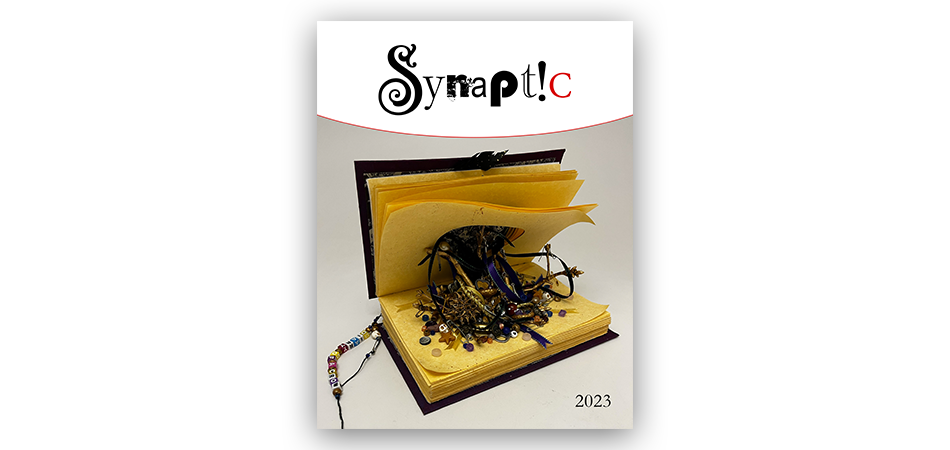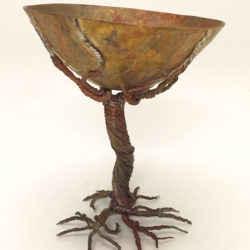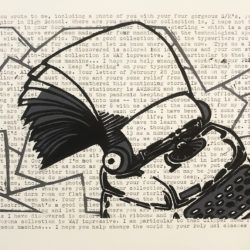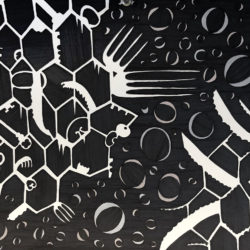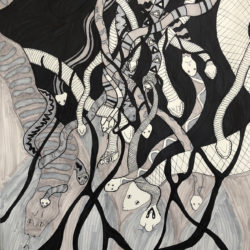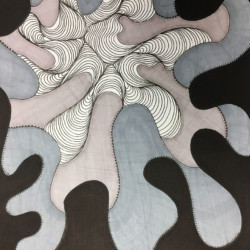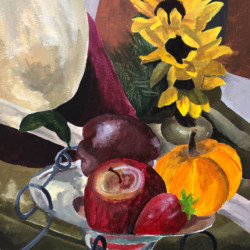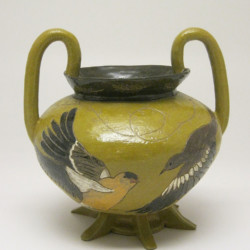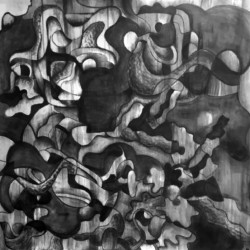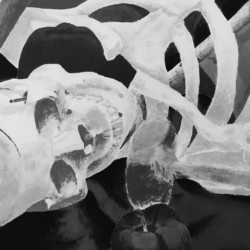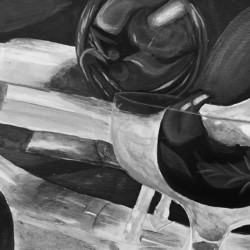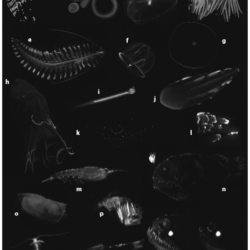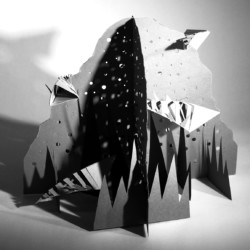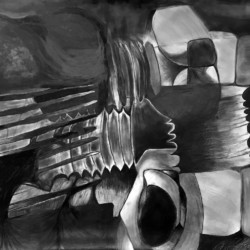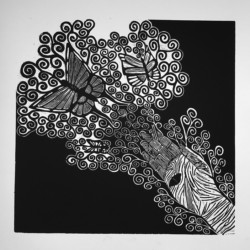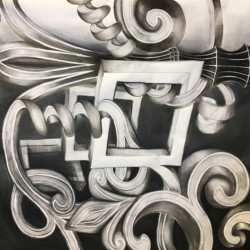Research/Experiments
Sycamore: A Sense of Wonder
By Ashley Robbins ’23
Leaves of the Sycamore are wide and fat. Sycamore’s latin name is Platanus occidentalis. Occidental is Latin for “relating to countries of the West” (North Carolina State University Extension). This is an important distinction, because in historical literature of Southwest Asia (notably the Bible), there are descriptions of “Sycamore” trees. These trees however are not the American Sycamore, they more closely resemble the fig tree (Easton).
See MoreBeauty and Monstrosity: Race in Early English Literature
By Quinn Deahl ’23
The medieval and renaissance periods of British history mark the point in time when England began developing its national identity. This evolution coincides with the increasing contact between the English and different national groups which allowed them to truly distinguish themselves. Early English literature reflects these developments and the subsequent attitudes that the English began to advance about themselves and their perceived others.
See MoreAxolotl: The Aliens of Mexico
By Leslie Delgado
Alien Salamanders exist in Mexico. Curious? Well, this “alien salamander” is named the axolotl, or Ambystoma dumerilii, and has been a prized Mexican icon for centuries, but they are on the bridge to extinction.
See MoreDido, Compulsory Heterosexuality, and the Lesbian Continuum
By Anika Faro ’23
Strong warrior women and regal queens are the epitome of strong female characters. In the Aeneid, Dido is a powerful queen who has fought for her people. Dido is the queen of Carthage who ends up falling so in love with Aeneus that she commits suicide at the end of Book 4. Adrienne Rich’s theory of the lesbian continuum and compulsory heterosexuality is useful in providing a new feminist analysis of Dido’s story in Book 4.
See MoreRemembering American Slavery: Learning From Germany’s Eradication of Antisemitism
By Quinn Deahl ’23
America is unlike Germany in its response to atrocity given that Germany has made significant efforts to acknowledge its responsibilities for the Holocaust and build a culture of remembrance, subsequently becoming a welcoming and inclusive place for the Jewish people that were once victimized while America has largely repressed its human rights violations against African Americans.
See MoreBirth Control: From Lab to Market
By Katie Wang
Between the years 2015 and 2017, a national survey conducted in the United States found that 64.9% of 72.2 million women used contraception. Of those women, the second most utilized form of contraception was an oral contraceptive pill. The only form of birth control which exceeded the use of the pill was female sterilization.
See MoreEnvironmental Minimalism and Inspirational Wonder in Paradise Lost
By Emma Chervek
Paradise Lost tells the story of the creation of the universe based on the Biblical account in the book of Genesis, focusing on Adam and Eve’s early life in Eden: earth’s ultimate paradise. This story is influenced by the natural characteristics of its setting and is therefore inseparable from the physical environment in which this story is set.
See MoreThe Realm of Faeries: Queerness and Neurodivergence in Jane Eyre
By Grace Patrick-West
During the Victorian era, interest in faeries began to peak. With the Brontë family connection to Ireland, Charlotte Brontë’s inclusion of faery lore in her novel Jane Eyre is quite useful in understanding her connection to both the time period she lived in and to her Irish lineage.
See MoreBlurred Boundaries: Soldiers/Terrorists, War/Peace
By Barbara Engleheart
In modern societies, violence is typically categorized into justified violence, or violence necessary for “the greater good,” versus violence as evil, criminal and unjustified. There are two constructs for which this differentiation has been naturalized so strongly that we usually would not even consider drawing parallels between them: soldiers and terrorists.
See MoreA Rooted Education
By Alora Nowlin '21
One of the most valuable skills we can learn today is how to live sustainably. This is easier said than done. There is not a class that can teach you how to live sustainably in the course of a single semester, since the resources that are available to us are ever-changing.
See MoreRecycling Crisis
By Lauren Goeke '19
I vividly remember my trip to Alberta, Canada in the summer of 2018. The wheels touched down on the landing strip. I found myself in a foreign land where the landscape, people, and priorities were completely different from my home in St. Louis, Missouri—and different from the college I attend in Pella, Iowa.
See MoreThe Function of Stabilimenta in Spider Webs
By Emma Clodfelter '21
Perhaps the most unique trait of spiders is their silk. Despite other insects producing silk at some stage in their development, spiders remain distinctive due to both sexes using silk throughout their entire lifespan.
See MoreEl Efecto de la Casa en la Salud en Comunidades Mayas
By Kayleigh Rohr '20
This paper deals with the impact of home and housing on health in Mayan communities, particularly in Yucatán. Kayleigh’s expansive investigation draws from areas such as human rights, environmental studies and the biological sciences in order to illustrate the interdependency of housing and access to culturally-appropriate health care.
See MoreLast Refuge: The Escape from Violence in Kafka on the Shore
By Bailey Anderson '18
Postmodernist novels famously defy convention and resist unifying theories or ideologies. They lack conclusionary details and the most bizarre occurrences are often left “up in the air.” Even in the novels themselves, readers are sometimes advised against trying to make too much out of the stories they tell.
See MoreThe Bohemian Problem: A Sociological and Literary Examination of Willa Cather’s Fraught Relationship with Czech Culture
By K.E. Daft '19
Willa Cather has been hailed, for decades, as an advocate for Bohemian culture.
See MoreBioluminescence in Lanternsharks and its Impact on Communication via Identification
By Braden Furness '20
Bioluminescence is a key part to many organisms and their lifestyle, both on land and in the ocean.
See MoreTeaching Elementary Mathematics to Students with Disabilities: Strategies for Instruction
By Marina Paul '21
When asked to think about learning challenges in elementary school, it would be safe to assume that many people would reflect on the difficulties of mathematics.
See MoreMachiavelli’s Politics and A Game of Thrones: The Board Game
By Matthew Wells '18
A Game of Thrones: The Board Game (GOT) is a laudable effort to put in players’ hands the chance to exercise their inner Machiavellian in a (hopefully) nonviolent fashion.
See MoreSocial Evolution of Bees Through Environmental Pressure
By McKenna Kilburg '18
Over eight million different species exist on earth, and of these, most species display some sort of socialization within or between species. This socialization can take the form of several frameworks.
See MoreEuclid’s Proof of the Pythagorean Theorem
By Katherine Lowe '18
This paper seeks to prove a significant theorem from Euclid’s Elements: Euclid’s proof of the Pythagorean theorem.
See More